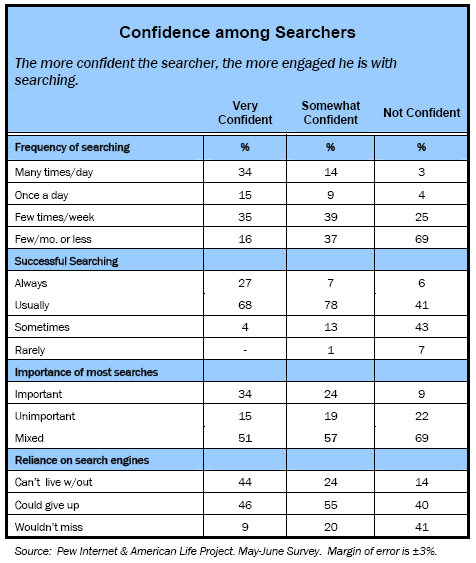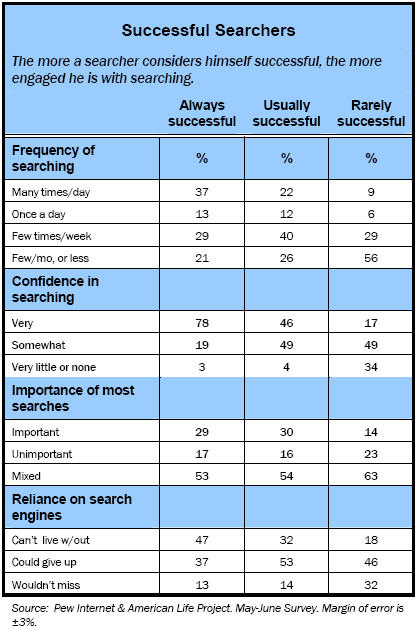Nearly all searchers are self-assured in their search abilities.
Internet users are very comfortable in their role as searchers. Some 92% of those who use search engines say they are confident about their searching abilities, with over half, 52%, of that group saying they’re “very confident” in their abilities, and 48% saying they’re somewhat confident. Only 8% of searchers say they lack confidence in their searching.

Who are they? Some 60% of very confident searchers are men and 40% are women. They are more likely to be young, better educated, and of higher income. The very confident searchers have more experience online than others: 89% have had internet access for more than 4 years, significantly more than the 75% of those somewhat confident searchers and 71% of those with no confidence.
Although searching is a positive experience for almost all searchers, it’s not surprising that the more confident the searcher, the more engaged he is as a searcher and the more rewarding is his search experience.
Of the 48% of searchers who describe themselves as very confident in their abilities, almost half, or 49% of them search at least once a day compared to 23% of those who describe themselves as “somewhat confident” and 7% of those who lack confidence in their search abilities. Some 34% of very confident searchers search several times a day.
Among the very confident searchers, 34% say most of what they search for is information that is important to them, compared to 24% of somewhat confident searchers and only 9% of searchers without confidence in their abilities. Further, Some 44% say they couldn’t live without search engines, compared to 24% of those who are somewhat confident and 14% of those who have no confidence. Of those who are somewhat confident, 55% say they like search engines, but could go back to other ways of searching. Of those without confidence 41% say they wouldn’t miss search engines at all if they could no longer use them.
Of the very confident searchers, 95% says they find their results most of the time, with 27% saying they always find the results they seek. Some 85% of those who are somewhat confident usually find their results, and even an impressive 47% of those who lack confidence in their searching say they usually find results they’re looking for. A recent study of computer science students at Wellesley College showed similar findings, that “the confidence a student has in her abilities to search the internet effectively does not significantly affect her performance.”18
Nearly all searchers feel they are very successful in their searching.
Nearly all searchers consider themselves successful in their searching. Some 87% of searchers say they have successful search experiences: some 17% of users say they always find the information they’re looking for, and an additional 70% say they find the information they’re looking for most of the time.
A look at those searching for health-related information online demonstrates this expression of success. Some 66% of internet users, over 53 million people, have looked for health information online. In a 2002 Pew Internet Project report, about 80% of health seekers reported that in their most recent search they found what they were looking for. Of the 20% who said they were not successful in their search, some 14% said they ran out of time and 6% gave up their search. Of those who were successful, 61% said the information was very easy to find; 33% somewhat easy to find.19
In another study, an independent observer evaluated searchers’ success in finding information online.20 Fifty-four searchers were tasked with looking for five different types of information, ranging from finding tax forms to finding a site that compares various presidential candidates’ views on abortion. Respondents were observed and graded on the success of their searches. The findings were similarly positive. In 4 of the 5 assigned searches, the success rate ranged from 85% to 94%. In the remaining search, 61% of respondents were successful.

While a sense of success is widespread among all searchers, the 17% of searchers who say they always find their answers are more serious and positive about their searching.
For the most successful searchers, the act of searching online is more ingrained into their everyday lives: 37% search several times a day, compared to 22% of the usually successful and 9% of the least successful searchers. These searchers are more serious about and invested in the searching they do than others. Some 47% say they couldn’t live without search engines, compared to 32% of those who are mostly successful, and 18% of those who are rarely successful.
While over half of all kinds of searchers will strike a balance of searching in earnest and searching for fun, those searchers who say they’re mostly successful are a bit more serious in their searches. About 30% of those who describe themselves as successful searchers look for mostly important information, compared to 14% of the less successful searchers, who tend to look more often for more trivial information.
Successful searchers are confident searchers. Some 78% of those who always get positive search results are very confident searchers, compared to 46% of those who get results most of the time and only 17% of those who are rarely successful in their searches.
Searchers seem to take to searching very quickly, considering themselves successful even if they aren’t as confident as veteran searchers. Searchers who are new to the internet generally consider themselves as successful at their searching as those who have been online for a long time.
There is a notion in some circles that searching on the internet is so easy and the sense of “successful” searching is so attainable that legitimate standards of research have been lost or compromised. The recent Wellesley study looked at how students conducted internet searches, and showed that students would largely stop researching at the first answer they found, than persist by looking at multiple sources.21


